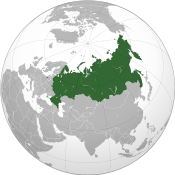Russian Orthodox Church elects first new patriarch of post-Soviet era
Wednesday, January 28, 2009
In its first such election since 1990, Russian Orthodox Church leaders have overwhelmingly chosen Metropolitan Kirill of Smolensk and Kaliningrad as its 16th Patriarch.
The 62-year-old Kirill, born Vladimir Mikhailovich Gundyayev, will succeed the recently deceased Alexy II as Patriarch of Moscow and all Russia. Alexy II, who is often credited with reviving the Church after the fall of Communism in Russia, was elected Patriarch a year before the Soviet Union dissolved, making this Russia's first patriarchal election of the post-Soviet era.

Image: www.kremlin.ru.
A secret ballot of the Church Council was held at the Cathedral of Christ the Saviour in Moscow, where 711 bishops, priests, and other clergy from 64 countries convened to elect the new leader of the world's second largest church. Kirill received 508 of the votes, while his more conservative opponent, Metropolitan Kliment of Kaluga and Borovsk, received 169 votes.
Kirill had served as locum tenens, or interim patriarch, following Alexy's death on December 5. Until being enthroned next Sunday, he will retain the title Metropolitan — the second most senior position in Church hierarchy.
The Patriarch-elect is seen by some analysts as a "modernizer" who might be able to improve perpetually strained relations with the Roman Catholic Church. While Alexy II had repeatedly denied the late Pope John Paul II's requests to visit Russia, Kirill had already met with his Catholic counterpart, Pope Benedict XVI, in December 2007.
Shortly before the election, Kirill had expressed a need to work with other Christian denominations in order to oppose "the marginalization of religion" and to "defend the underlying meaning of morality". However, this call for unity was tempered with a call to resist Catholic missionary activity on Russian territory, and to "quickly and decisively react to threats" where necessary.
"A meeting between the Patriarch and the Pope will become possible only when there are conclusive signs of real and positive progress on issues which for a long time have been problematic for our relations," Kirill said Monday in a newspaper interview. These issues include accusations of missionary activity and disputes over church property and influence in Ukraine.
While some analysts see Kirill as a politically-minded figure who may try to seek more independence for the Church under the Russian government, others say this is unlikely. "As it is, the Moscow Patriarchate never criticises the Kremlin over its internal or external policies, said Canon Michael Bordeaux, head of the Keston Institute. "In the Orthodox tradition, which goes back 500 years, the state and the Church work together."
The Russian constitution officially declares a separation of church and state, but ties between the Orthodox Church and the government have strengthened since Vladimir Putin's election as President in 2000. Alexey was a strong supporter of Putin's government, but Kirill's stance is less known.
A short list of three candidates for the election had been chosen by the Archbishops' Council on Sunday. Metropolitan Filaret of Minsk, the first Patriarchal Exarch of Belarus, had withdrawn his name from consideration and endorsed Kirill before Tuesday's final vote.
Sources
- "Outspoken Kirill elected new Russian patriarch" — Agence France-Presse, January 27, 2009
- "Russian Orthodox Council Electing New Patriarch" — Voice of America, January 27, 2009
- Sophia Kishkovsky. "New patriarch elected in Russia" — International Herald Tribune, January 27, 2009
- "Russian church picks new head" — CNN, January 27, 2009
- AFP. "Orthodox meet to pick new leader" — The Australian, January 27, 2009
- "Russia's new patriarch seen as moderniser" — Reuters, January 27, 2009
- Mansur Mirovalev. "Russian Orthodox Church elects leader" — Associated Press, January 27, 2009



